Maybe we’re looking for lazy in all the wrong places. Maybe it’s easier to look at the flip side of lazy, and that would be slavery. Whatever popular notion of that shameful practice, it should be noted that slavery did not originate in the U.S. Most of our common ancestors lived in some form of subjection or other. From earliest historical times onward there was always a slave to peel the pharaoh’s grape or build his pyramids. In the U.S. it has its lasting affects, or hangover, by wreaking vengeance on a population partly by weakening the nobility of work.
☞ On a riverboat sailing down the Ohio River in 1831 Alexis de Tocqueville observed a radical difference between Kentucky on the starboard side of the river boat compared to Ohio on the port side. The Ohio vista displayed prosperity— healthy crops, attractive homes— while on the slave-holding Kentucky side everything appeared to be in a state of decay and degeneration. He concluded that difference to be the result of slave versus free state. The fine gentlemen of Kentucky  were in no mind to do “niggah work.” By that token, the black man was not the only one enslaved. The white man put off his humanity too, his moral obligation to toil for his own welfare, because he had to believe the black man was less human than he to do animal work.
were in no mind to do “niggah work.” By that token, the black man was not the only one enslaved. The white man put off his humanity too, his moral obligation to toil for his own welfare, because he had to believe the black man was less human than he to do animal work.
“Farmers on the Ohio side were not only free to deal with the labor and bounty of growing crops and keeping up their property, they were also free to hire out to others and generate the economy, whereas in Kentucky white men, gentlemen in particular, did not do the work assigned to Negroes and were therefore resolved to live in a state of disrepair, poverty, and degeneration.” (Democracy in America, p 332)
☞ Adding to de Tocqueville’s estimation, the state of Kentucky still remains not merely a welfare state, but boasts the most miserable economy in the union. So poor that the franchise companies use it as a tax base in order to exploit low grade living on the heritage of the lazy. Furthermore, following the way the slaver believed dominance over slaves was a matter of Providence, many descendants of slaves now believe that government is their Providence. All that’s required is to get that race thing going again.
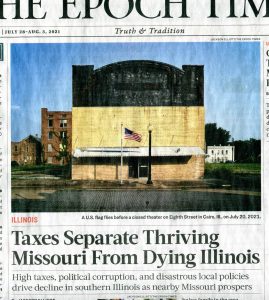 ☞ Addendum to the addendum: a recent account ran in the Epoch Times about malfeasance in “dying Illinois,” dealing with that state’s jiving political machinations compared across the Missouri state line where things are going better. The article shows how the same Kentucky-Ohio dynamic is in play jest on up’n the Mississippi. Plus ca change, eh?
☞ Addendum to the addendum: a recent account ran in the Epoch Times about malfeasance in “dying Illinois,” dealing with that state’s jiving political machinations compared across the Missouri state line where things are going better. The article shows how the same Kentucky-Ohio dynamic is in play jest on up’n the Mississippi. Plus ca change, eh?
☞ William Blake conceived of “mind-forged manacles” just by walking London streets: “I mark in every face I meet/marks of weakness marks of woe.” And the sound coming out of those faces was the sound of “mind-forged manacles.” No image could be more appropriate for getting the grit of racial strife. Manacles the mind creates in its own hot dark sweaty forge. Minds creating their own personal slavery, regardless of color or the after affects of actual slavery, the obverse vengeful practice of reverse racism: mind-forged manacles on both sides, white and black.
☞ In the Plymouth colony (1620 version of American settlement) the change from a compact agreement of equal individual shares among the colonists was inevitable. Agreement upon equal division of shares was abandoned shortly after establishment when the rubber of reality hit the road of actual life. Equal sharing was dumped when certain members failed to uphold their end of necessary tasks; in other words, the slackers were not doing their share of chores for surviving harsh New England winters. To put it into our more delightful terms: some appeared lazier and more shiftless than the others. Governor Carver saw no reason to reward them, especially facing dire needs for winter supply.
William Bradford, in his History of Plymouth Plantation (written 1620-1651) describes the changes of participation by first disdaining “the vanitie of Platos and other ancients… that the taking away of propertie, and bringing in communitie into a comone wealth, would make them happy and florishing; as if they were wiser than God. For this comunitie (so far as it was) was found to breed much confusion and discontent, and retard much employment that would have been to their benefite and comforte. For the yong-men that were most able and fitte for labour and service did repine that they should spend their time and streingth to worke for other mens wives and children, without any recompense. The strong, or man of parts, had no more devission of victuals and cloaths, then he that was weake and not able to doe a quarter the other could; this was thought injuestice.”
☞ Therefore, right out of the chute at the very foundation of the nation, the flawed expectation of all to be a brother’s keeper grew into full rebellion. Yet Bradford excuses it: “Let none objecte this is mens corruption, and nothing to the course it selfe. I answer, seeing all men have this corruption in them, God in his wisdom saw another course fiter for them.” It would have seemed that the Law of Lazy was in full practice at the outset of the colony. Only, all that was required to get folks off their duff was merely changing expectations of its members. Self interest trumped what appeared to be at first an unwillingness to work. Working for one’s self was the “fiter course.” Each was given a private plot, along with some expected contribution to the community. Yet of late, with all the busy collective participation in current labor conditions, with all the renewed intellectual “vanitie of Plato and other ancients,” with all the divvying up of the national swag to fit the more unfit, it seems the Law Of Lazy is making a comeback in the colonies.
☞ WASH YOUR DISHES
One import to the story told in Part I of Law of Lazy about the old farmer who mistrusted a draw well because of its satanic implications, it’s a clear reading of how a labor-saving device deprives the user of simplicity of heart, and simplicity is a defense against the demonic. In a complicated technologically advanced society simplicity, or honesty, is a large virtue. Simplicity strikes a harmonious note between doer and deed. On one hand, it cuts through the mess of unnecessary mess. Definitely a key in a very modern dilemma, a lost key. With so many complications and addenda to every mundane act— filling the proper form, hitting the correct key— directness of effort is nullified. One Zen koan (simple dialog designed to point the way to Nirvana) suggests a meditation on simple action of completion.
A young acolyte monk approaches his Zen master and asks point blank the big question to enlightenment:
“Master, what is satori?”
Because you never get a straight answer out of those guys, the master replies with another question: Have you eaten?”
“Yes, I have eaten.”
“Then wash your dishes.”
Besides the obvious moral of cleaning up your own mess, further reverberations are sounded. It could mean, complete the act you have begun. You eat, therefore you wash your dishes. Following that line, what could be expected of larger things, like marriage? Much like karma, where consequences of an act could be instant payback for a commitment to the moment, or it could be generational atonement. Someone has an accident, that’s payback for the moment. If however that person has a predisposition for accident, stumbling into it again and again, that’s more like karma— much like voting democrat. Consider further how this notion strikes at the heart of the Law Of Lazy just by starting with doing your dishes.
☞ Some time during the Eisenhower administration the Gross National Product tipped from manufacturing to service, or what might be called the “massage industries.” To refer to the entire service industry as a massage industry might at first seem flippant, but remember that the ultimate massage a client might receive is an actual heart massage in a hospital. Metaphorically speaking, much service today seems all “heart massage.” The market, true chooser of national desire, had decided to sell services to others rather than make something. And it’s never looked back. By the time of the Obama administration, the guest book into the White House was most signed by the president of the service industries union.
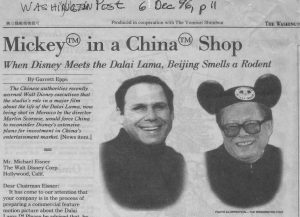
China buys Mickey Mouse
☞ As a reminder of how industry has changed in 2021, consider what Chicago columnist Bob Greene wrote in June 1991: As far as the economy’s concerned, this country is changing forever. And you don’t have to be a financial analyst to know it… Forget the sophisticated economic indicators. Forget the stock market trends. All you have to know is this: The people in charge of the Dow Jones Industrial Average have just announced a change. The Dow is dropping one of the stocks that has been part of the industrial average since the very beginning: U.S. Steel (now called USX Corp.). In its place, the Dow Jones Industrial Average is adding the Walt Disney Co…
When, in 1928, the original Dow Jones Industrial Average was born with its 30 stocks, the stocks were a portrait of what American business was: International Harvester. Standard Oil. General Electric. General Motors. General Railway Signal. Mack Trucks. American Can. Sears Roebuck. Union Carbide. Westinghouse Electric.
And, of course, U.S. Steel.
For all the years the Dow has been in existence, U.S. Steel has been a mainstay. Even when U.S. Steel became USX in the ’80s, of course it stayed on the Dow.
Until last month. Now it’s gone-replaced by Disney.
The reason? Disney is “a major entertainment company, including movies, theme parks, TV, books and records … (its services) reflect the increased importance of entertainment and leisure-time activities in the economy.”
Disney, in short, is a “service conglomerate.” U.S. Steel, of course, was a manufacturing company. No way to gloss over that-U.S. Steel manufactured something, and that something was American steel.
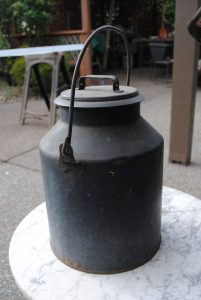 ☞ Exhibit A: MILK CAN AS ARTIFACT
☞ Exhibit A: MILK CAN AS ARTIFACT
The milk pail purchased at a flea market is now used at my home for holding barbecue charcoal. It’s a smaller version of the commercial pail my uncle used on his dairy. More of a personal one, the smaller pail probably for home use, the one milady carried inside to pour fresh milk for the table or churn the butter. This highly utilitarian item is a reminder of days spent at my uncle’s dairy. Uncle Frank, up at 3 a.m., in all weather, to milk the herd and fill the milk cans. They were indeed essential. Essential now only as the ideal weatherproof storage for barbecue charcoal, and not of much use in producing an essential item. It, and items like it, can be found in the smart new factory building make-over as a shopping center housing chic boutiques.
☞ Exhibit B: BLUE CHAMBRAY SHIRT
An old advertisement in Life has three fellows enjoying a Lucky Strike: one a doctor in his smock, one in a sailor suit, and the third a worker who helped build the ships to halt the Hun. The worker is recognizable by his blue chambray shirt: uniform of the working man. The blue collar— for which labor itself has been named— perched around a neck doing a job. Personal recollections picture my dad going to work outfitted in that same uniform: a blue-chambray shirt, washed so much it was almost translucent, and bearing holes from the caustic materials he handled. That memory popped up while browsing in a clothing shop on Nathan Road in Hong Kong and looking over the latest cheap knock-off— “yes, you like cheap price”— a blue chambray shirt. The same shirt my dad wore in the factory for thirty years. Only the one before me in the copy shop was cut slim, short sleeved, and sported an Yves St. Laurent designer label sewed on crookedly. It was clearly not sold for the purpose of heavy labor. More for a casual party at the club. And it goes perfectly with custom denim jeans— three hundred bucks on line— formerly the exclusive garb of farmers and men who worked with their hands. And if so desired, an extra two hundred clams will get you a pair of jeans, pre-holed and patched for that wretched-of-the-earth look while sipping your raspberry martini.
☞ After heavy industry was largely incapacitated around the 70s, corporate raiders— or corpse raiders— swooped down in the 80s to feed on the remains of the moribund factories. The more moribund the better. Remaining factory buildings were left to rot in the rain or transformed into boutique malls specializing in the sales of antiques and fashions sewn in Asia.
☞ Perhaps an illusion, yes, but it seems the most time folks outside the work place are observably putting out energy is when they’re at play. Laissez-faire becomes lazy fair. Leisure world dictates such a large part of the world in general, it is ubiquitous. When new, interstate highways accommodated the larger vehicles almost exclusively as some utility rig or hauler. But things have changed to the point where an almost equal portion of vehicles populating the road are hauling leisure: travel trailers, SUVs loaded with play equipment, or a bus-size RV. Leisure business is big business.
 ☞ Play togs from China match the equipment utilized by folks at play— from sportsters to scuba divers— expending unlimited amounts of energy, along with beaucoup bucks. A favorite item in the catalog of lazy faire is the amusement park. Modern amusement centers mirror Aldous Huxley’s Brave New World, telling of how society finds the fun way to collective social thought control by way of amusements like the “feelies” where you can actually feel the movie effects, the kisses and shocks, or visit the amusement park featuring a thrill ride on an “electric bumplepuppy.” In today’s brave new world the amusement seeker can choose spectacular rides that greatly supersede the thrills of a 1926 electric bumplepuppy. Or if the player chooses, he can even pretend to be a heavy equipment jockey in playground Las Vegas.
☞ Play togs from China match the equipment utilized by folks at play— from sportsters to scuba divers— expending unlimited amounts of energy, along with beaucoup bucks. A favorite item in the catalog of lazy faire is the amusement park. Modern amusement centers mirror Aldous Huxley’s Brave New World, telling of how society finds the fun way to collective social thought control by way of amusements like the “feelies” where you can actually feel the movie effects, the kisses and shocks, or visit the amusement park featuring a thrill ride on an “electric bumplepuppy.” In today’s brave new world the amusement seeker can choose spectacular rides that greatly supersede the thrills of a 1926 electric bumplepuppy. Or if the player chooses, he can even pretend to be a heavy equipment jockey in playground Las Vegas.
IN ORDER TO FORM A MORE PERFECT UNION:
FACTIONS AS THE F-WORD
More than the other fellow founders who distrusted harmful divisions, James Madison seemed to consider factions as the f-word. No wonder. He’d already seen how the country of his native origins had been torn by factions, or maybe regarding the contemporary revolutionary shenanigans in France. It impelled him to write in Federalist IX that “The utility of a confederacy, as well to suppress faction [italics added] and to guard the internal tranquility of the States, as to increase their external force and security…” Suppressing factions in order to keep internal tranquility seems uppermost in a mind cognizant of England’s not-so-Glorious Revolution when puritans ruled under the interim madness of Oliver Cromwell. Protestants ruled the population according to their own instituted tax and privilege scale from Anglican to Baptist, with Jews and Catholics paying an extra tax or losing property, or even in Ireland paying with their lives— a condition still existing today with Jews and Christians in Muslim countries. Theaters were closed. Bye bye music. Or perhaps Madison got word about the French getting ready to chop heads according to pants: pantalon-wearing Jacobins murdering aristocrats in their short-breeches and hose, cullottes versus sans-cullottes. And priests in long robes— look out!
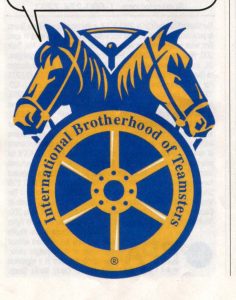 ☞ When the concept of unionized labor is attached to the mere idea of faction, the fit isn’t right. Faction is too small a word. When a labor union goes national, it’s more than a faction. It’s a megalith, a behemoth, what Hobbes called Leviathan. Or perhaps it’s more of an amoeba, the way it divides itself into other life forms— the way the service sector of the economy expanded as the production entity shrank 20% in twenty years. After which, the Service Employee International Union broke off from the American Federation of Workers. (Note how SEIU smacks of an international scent in its title, whereas AF of L designates American labor.)
☞ When the concept of unionized labor is attached to the mere idea of faction, the fit isn’t right. Faction is too small a word. When a labor union goes national, it’s more than a faction. It’s a megalith, a behemoth, what Hobbes called Leviathan. Or perhaps it’s more of an amoeba, the way it divides itself into other life forms— the way the service sector of the economy expanded as the production entity shrank 20% in twenty years. After which, the Service Employee International Union broke off from the American Federation of Workers. (Note how SEIU smacks of an international scent in its title, whereas AF of L designates American labor.)
☞ Unlike Japanese trade unions that operate within the boundaries of the outfit they work for, by contrast American unions stretch into every hill and dale, county and city and— as just noted— over the big blue sea. Alliances megalithic enough to give James Madison the jitters. Japanese unions represent trades within the corporate organization— from steel rollers on the floor to middle level management— and they therefore preserve a unity of mind and purpose in producing their product. Judging the latest concerns of American unions, teachers in particular, their product is apparently not of uppermost concern. The product of the NEA, being national education, does not seem to hold much esteem in the bogus programs they promote. Considering that American student scores fester at the bottom of the barrel worldwide— just above Estonia and Ukraine— it would appear that the end product of educating the scamps is not so high on the list of union achievement. At least the Japanese know how to make a good car.
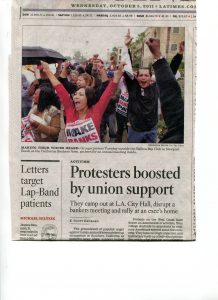 ☞ Unions seem to collect around the cause of not working. The original idea of work, transferring potential energy to kinetic energy— tote that barge, lift that bail— lazy was even frowned upon. In Marxist circles, counter-productive was not good for the production of long tons. Presently, organizations designed to gather beleaguered workers under their wing have come to promote every notion they can think of against work. Something has basically gone awry. Or has it? Since lazy is as lazy does, it might be a natural progression of the Law of Parsimony— economy of energy. It just might make sense that workers would gather, strike, coerce, or otherwise make their presence unpleasantly felt in the struggle for the labor-saving paycheck.
☞ Unions seem to collect around the cause of not working. The original idea of work, transferring potential energy to kinetic energy— tote that barge, lift that bail— lazy was even frowned upon. In Marxist circles, counter-productive was not good for the production of long tons. Presently, organizations designed to gather beleaguered workers under their wing have come to promote every notion they can think of against work. Something has basically gone awry. Or has it? Since lazy is as lazy does, it might be a natural progression of the Law of Parsimony— economy of energy. It just might make sense that workers would gather, strike, coerce, or otherwise make their presence unpleasantly felt in the struggle for the labor-saving paycheck.
☞ Consider the usual thrust of worker demands for more pay, more generous pensions, and selectively restrictive working conditions, each putting a brother and sister further away from work. The way a brother trucker can’t touch packages, a musician can’t play one bar, or a meat cutter can’t slice one more piece of meat past quitting time. It seems that unions are more devoted— and contrary to the purpose of their formation— to not working. Help is required here in recalling demands in contemporary union history not related to working less. Besides godly retirements, beginning at an age when others are just getting going, there are big health benefits to round out their little sleep. and absolutely no concessions! Among the conditions leading to a grocery workers strike in early 2000 was the egregiously cruel expectation of bosses for members to pay the slightest co-pay for monthly medical coverage; ten bucks was too damned much! Would ten bucks even cover the cost of paperwork paid to another union? And now it’s baby birthing. Less hours for bigger pay— even when the company is headed for bankruptcy. All headed toward the labor-saving paycheck.
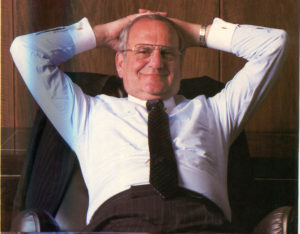
Lee Iacocca
☞ Even company survival doesn’t keep selfish greed in check. At a point when Lee Iacocca was barely holding the Chrysler corporation together as he negotiated survival loans with a federal administration so very loathe to grant it, the beleaguered CEO also had to hold off the workers’ unions who were demanding their usual benefit and wage increases. The boat was sinking, but the brothers and sisters on deck were still squabbling and grabbing.
 ☞ The overall effect creates a suspicion that a worker is guaranteed not to fulfill his task, a principle that even contradicts the hero they loudly espouse: Karl Marx. The goal of Marxism was supposed to be the complete unification of the worker with work and leisure so that there would be a seamless connection between the two. But with a stringent hard-ass atmosphere created by unions in the workplace, how is a worker to be connected with his work when job time is strife for more and more against a hated force? Who wouldn’t have a problem keeping greed and soul apart?
☞ The overall effect creates a suspicion that a worker is guaranteed not to fulfill his task, a principle that even contradicts the hero they loudly espouse: Karl Marx. The goal of Marxism was supposed to be the complete unification of the worker with work and leisure so that there would be a seamless connection between the two. But with a stringent hard-ass atmosphere created by unions in the workplace, how is a worker to be connected with his work when job time is strife for more and more against a hated force? Who wouldn’t have a problem keeping greed and soul apart?
☞ Then came the invasion of the functionaries. That government workers were permitted to form unions was always puzzling. If you’re working as a tax payer to perform a tax payer’s job to pay taxes out of your tax paying salary— that just presents too many layers. But Jack Kennedy approved of federal worker unionization (And he was the more sensible one.) so that the floodgates opened. Dead for any real service, bureaucrazy unions grow like a vestigial penis trying to stick into any corporate body surviving the most recent economic black plague.
☞ One reason the union might be considered vestigial would be its lack of force, or the primal energy unions were founded upon. One flaming reason would be its lack of fiber for things constructive. And when a bureau goes union— when it really isn’t constructive to begin with, working files, ruthlessly overseeing the work of others— there’s little left but more prize awards for the Peter Principle: everyone kicked up to his or her highest level of incompetence i.e. LOL.
☞ Bureaucracy drove the final nail. Growing out of a work force of file clerks who were initially satisfied with secure jobs at low pay, bureaucracy has grown several Medusa heads, one more inefficient and self-important than the last. A plethora of paper-pushers and digital bean counters have created armies of self-important clerk integers waving the banner of incompetence while demanding greater benefits— and power. And as they control the files, the files grow, more jobs for more files looking in on one another. The last four years was a theatrical demonstration of secret files in action.
☞ Incompetence, however, is not enough to curtail the pursuit of the labor-saving paycheck. Examples of bureaucrazy incompetence are countless, but one stands out: the kidnapping of an 11 year-old girl held in captivity for 18 years and impregnated twice. This was the case of Phillip Garrido— a convicted sex offender— and his victim, Jaycee Lee Dugard.
 Besides being one more geek in the lineup of male monsters celebrated daily on the Cyclops, this case is especially poignant by how it exemplifies the LOL factor. Sex offender Phillip Garrido was visited regularly by parole officers and even by policemen who responded to reports of sinister activity on his premises. And what was on his premises was a warren of tents and shacks wherein little Jaycee Lee Dugard was held captive along with the two children she was forced to birth. But nothing seemed suspicious to the official eyes visiting the property and observing a back yard full of tent and shack structures with wires and hoses leading into them. Social workers sing the usual blues about overloaded case files, and police have their cautions in investigating unusual reports, but this home in particular was the abode of a parolee busted for bringing kidnap victims to a storage unit for the purpose of prolonged rape and torture. That record, however, did not conjure enough curiosity to defy the Law Of Lazy
Besides being one more geek in the lineup of male monsters celebrated daily on the Cyclops, this case is especially poignant by how it exemplifies the LOL factor. Sex offender Phillip Garrido was visited regularly by parole officers and even by policemen who responded to reports of sinister activity on his premises. And what was on his premises was a warren of tents and shacks wherein little Jaycee Lee Dugard was held captive along with the two children she was forced to birth. But nothing seemed suspicious to the official eyes visiting the property and observing a back yard full of tent and shack structures with wires and hoses leading into them. Social workers sing the usual blues about overloaded case files, and police have their cautions in investigating unusual reports, but this home in particular was the abode of a parolee busted for bringing kidnap victims to a storage unit for the purpose of prolonged rape and torture. That record, however, did not conjure enough curiosity to defy the Law Of Lazy
 ☞ As a marginal note: Jaycee Lee Dugard’s story is re-told daily on the southern U.S. border by the hundreds, possibly by the thousands. But this time the routine kidnap and rape of young girls is not made possible by lazy immigration officials. On the contrary, those beleaguered officials are pitifully over-whelmed by machinations from above, an entire assemblage of buffoons, cretins, and sadistic power mongers ignoring the job that James Madison expected. What was that again? Oh yeah, “to suppress faction and to guard the internal tranquility of the States, as to increase their external force and security…” Yes, suppressing danger to the internal tranquility of our greater union, the one they call America. So we see that when it operates higher up, failing supreme duty, the Law of Lazy can assume tragic proportions.
☞ As a marginal note: Jaycee Lee Dugard’s story is re-told daily on the southern U.S. border by the hundreds, possibly by the thousands. But this time the routine kidnap and rape of young girls is not made possible by lazy immigration officials. On the contrary, those beleaguered officials are pitifully over-whelmed by machinations from above, an entire assemblage of buffoons, cretins, and sadistic power mongers ignoring the job that James Madison expected. What was that again? Oh yeah, “to suppress faction and to guard the internal tranquility of the States, as to increase their external force and security…” Yes, suppressing danger to the internal tranquility of our greater union, the one they call America. So we see that when it operates higher up, failing supreme duty, the Law of Lazy can assume tragic proportions.
☞ In a recent conversation with a liberal friend, my staunch partisan amigo set off a barrage of criticism against any suggestion of curtailing union activities. Don’t remember the detail, it was so trivial, but mere mention of reigning in union power meant to my staunch partisan pal that society would immediately backslide into the ruthless world of unlimited control over the worker. Laborers would be thrown back into the inhuman working conditions of 12-hour shifts on limb-ripping machines. Hardly likely. It sure taxes the imagination to see today’s plump progeny— armed with distractive doodle boxes and backpacks Mom filled with snacks— being forced onto textile looms. That’s for the Chinese children.
What my friend didn’t realize was how much he’d swallowed the psychological trick tediously performed at the Organized Labor Magic Show. Because of modernized labor conditions— enhanced by federal muscle— work has become egregiously protected. Some would even argue over-protected. It’s therefore necessary to color working conditions in a certain way to scare up the LOL factor. The trick is to disguise lazy by putting on suffering. Again, examples abound. Here’s a couple.
☞ Prison guards in Illinois claimed compensation for suffering the intolerable stress of turning the old nineteen century door locks in the antiquated prisons. In other words, the turnkey no longer possesses the moxie to turn the key. In following natural law dictated by parsimony of action, our unions uphold a cardinal principle of evolution which is economy of action, further demonstration of the Law of You-Know-What.
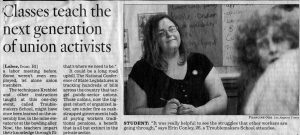 ☞ Bus drivers in Detroit, making more than a 160 large per year, claim compensation for enduring abuse. One driver turned in a compensatory claim for being spat upon. That particular driver should try substitute teaching for a training course.
☞ Bus drivers in Detroit, making more than a 160 large per year, claim compensation for enduring abuse. One driver turned in a compensatory claim for being spat upon. That particular driver should try substitute teaching for a training course.
☞ As noted above, a primary and most pernicious example of the Law of Lazy would be teaching unions who trump up the danger of Wu Flu so that teacher members can isolate themselves from tykes who have virtually no significant flu episodes. The schoolmarm alarm is so trumped up, so far from reality that black widow spider bites from unused book shelves pose greater danger to the teaching staff. And this behavior is rewarded with full pay. (Let’s hope retirement points are credited.) In the past teachers were trained to lead by example, and this current crop has truly led the way to the labor-saving paycheck.
☞ HAIR ON MY CAN
To review: in gaining the labor-saving paycheck, strategies of jacking up illusions of suffering endured by exploited employees is a major tactic. The strategy is especially necessary when things are actually pretty darned good, as it had been during the previous administration. It has been in fact uphill all the way in convincing auto workers to join the union in the South where foreign car manufacturers make up half of total production. The union has failed to gain a foothold with workers there because factories are no longer dreaded “Satanic mills,” as Blake described them, and as Marx and Engels reviled them. The present-day southern auto factories run by Honda, Toyota, Mercedes, etc. are described by one auto industry analyst as “warm and fuzzy.”
Thus, with satanic working conditions pretty much abolished in the civilized world, how is the pose of the suffering worker as victim— or as Larry Elder would have it, the suffering victocrat— to be perpetuated? The Great Screen Cyclops and its minions form the major line of offense on that challenge. With more feminist power coming on line, the nuclear option launched into the field of victocracy upon a sexually demoralized public would be sexual harassment.
☞ A current example beaming out of the Cyclops is the case of Andrew Cuomo, the sorry governor who seems to have blown off responsibility for the deaths of thousands of aged plague victims, but got slammed for touching tooshies. Cuomo ignored the hospital ship parked in the water nearby and chose instead to send the patients to commingle with the infected. That should have drawn some attention beside popular awards. But no, the death warrant to the fifteen thousand or so deaths could only be trumped by a dozen touched tooshies.
First let it be observed that a tooshie enjoys the sanctity of any other property line, and being one’s person, it’s the most sanctified property line. Crossing that line without invitation, therefore, is immoral and illegal. So the decision was obviously defined by party factions to skip the administrative horror and raise hell instead about touching tooshies. For the donkey party, that’s always an ace in the hole. In Cuomo’s case it defines an utterly skeptical, if not cynical, position: to condemn minor immorality while letting him skate on mass extinction. It’s a position the ultimate skeptic David Hume argued when he stated that he should prefer the death of a thousand men to the cutting of his finger because the cut he could feel. In the case of Andrew Cuomo, cynical party factions preferred the death of fifteen thousand elderly citizens (likely a bunch of vets in there) to the touch of a dozen tooshies before objections were raised. Even more horrible is how those vets had to die alone. They would have had more sympathy and better coverage in battle.
☞ The Cuomo case is invoked merely as a check on the current progress in a history highlighting the sexual plague of harassment. One early pioneer moment in that bill of worker sufferance stands out. One moment in the destabilization campaign over metaphorical touched tooshies involved Judge Clarence Thomas and his putative “victim,” Ms. Anita Hill.
At the time of the Clarence Thomas high-tech lynching, democrats (known for a lynching past) attempted to block him from the court. In that service, Anita Hill, a legal assistant who worked with Thomas, was questioned concerning the judge’s behavior. Out of that hearing process another early-on concept of trumped up suffering was borne. It came on the wings of a classic question posed by then-Senator Joe Biden. It was our future 46th president who asked the ground-breaking victocrat question: How did you feel?
But that’s not the example, just background. The example of trumped up suffering came by way of a reported column on Anita Hill’s entry into the Hall of Victocracy. An Australian feature writer, Alice Roddell, wrote how Anita Hill’s sufferance in the workplace was the same as coal miners buried in cave-ins and factory workers having limbs torn; according to the writer Anita Hill was in that procession of martyrs. Sensational color writing is always eye-catching, but the few examples remembered from the Thomas hearing didn’t really include torn limbs nor cave-in burials. There weren’t even harsh words nor physical molestation, no touched tooshie, and certainly no forced time on the casting couch. All Hill endured were words. And those supposedly vile utterances were couched in innuendo.
He made remarks, Hill reported. Once he noticed a hair on his coke can and he said he hoped it wasn’t a pubic hair.
“And how did you feel when he said (gasp!) pubic hair?” was asked by the senator from Delaware possessed of a nose renown for sniffing hair.
☞ Concessions demanded in the marketplace are constant, yes, but on the eternal level of an individual meeting a task with some quality, seems like a lot of slippage has occurred due to the Law of Lazy. Task, concession, and quality production are not even in the same room. A suspect cause might be an idea; it might be a notion that drives the worker to thoughts of paradise in Marx land. Karl, champion of labor who never held a job but writing his diatribes for New York newspapers, presupposed a world where the worker controlled the means as well as the method of his work. Not only sharing company profits, but integrating his work with the rest of his life. Everything in balance: supply, production, happy unselfish workers hardly able to tell their work from their play in that wonderland. Tra la la…
☞ Wonderland might be what it sounds like to the average income earner or businessman when he hears about a Detroit bus driver pulling in 160 Gs per— and then claiming compensation for being spat upon. Either drivers driving in Detroit are in wonderland, or they must just be fantastically expert bus drivers deserving of the labor-saving paycheck.
JoCo, Post-Modern Prospector Emeritus

